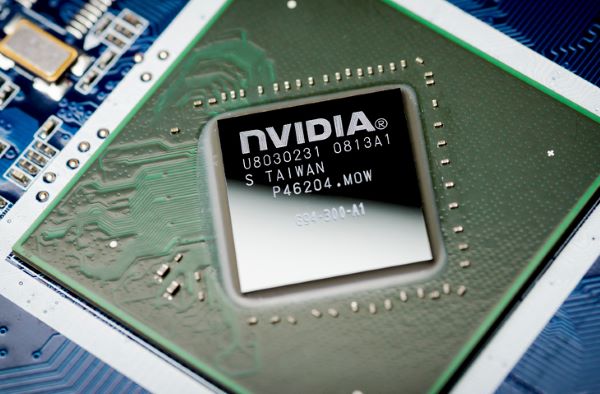ii view: AI chip maker Nvidia hails next industrial revolution
Enjoying record demand from corporate datacentre customers and now launching another generation of super high-powered chips. Buy, sell, or hold?
23rd May 2024 11:56
by Keith Bowman from interactive investor

First-quarter results to 28 April
- Revenue up 262% year-over-year to $26 billion
- Adjusted earnings per share up 461% to $6.12
- Cash dividend of $0.10 per share, up from $0.04 in Q4
Guidance:
- Expects second-quarter sales of around $28 billion
Chief executive Jensen Huang said:
“The next industrial revolution has begun — companies and countries are partnering with Nvidia to shift the trillion-dollar traditional data centers to accelerated computing and build a new type of data center — AI factories — to produce a new commodity: artificial intelligence.”
- Invest with ii: Buy US Stocks from UK | Most-traded US Stocks | Cashback Offers
ii round-up:
NVIDIA Corp (NASDAQ:NVDA) reported first-quarter sales and earnings which comfortably exceeded Wall Street forecasts, with the computer chip maker also offering a sales outlook ahead of estimates.
Booming demand for its chips used in datacentres to run artificial intelligence (AI) software helped overall sales climb 18% from the previous quarter, or up 262% year-on-year to $26 billion. That fuelled a near five-fold increase in adjusted earnings year-over-year to $6.12 per share. Nvidia also announced a 10-for-1 share split in tandem with the results.
Shares in the Nasdaq 100 company soared 6% in afterhours US trading to a new all-time high above $1,000, which means it has more than doubled in value already in 2024. That’s comfortably ahead of a one-fifth gain for fellow chip maker Advanced Micro Devices Inc (NASDAQ:AMD) this year and ahead of a 14% and 26% rise for cloud datacentre providers and customers Microsoft Corp (NASDAQ:MSFT) and Google owner Alphabet Inc Class A (NASDAQ:GOOGL). The Nasdaq 100 itself is up 13%.
Nvidia predicted sales for the current second quarter of $28 billion, surpassing existing analyst estimates of $26.6 billion and up from the $11 billion estimate given this time last year.
Nvidia’s data centre related revenue rose 23% from the prior quarter and by 427% from Q1 last year to a record $22.6 billion. Sales from its new next generation more expensive Blackwell chips are expected to begin coming through later this year. The Blackwell has around 208 billion transistors compared to around 4 billion for some conventional current computer chips. Nvidia chips also come with its own Cuda software, setting them apart from rivals and boosting profit margins.
Sales of its once core gaming related chips climbed 18% year-over-year to $2.6 billion. Automotive and robotic related sales grew 11% to $329 million.
The Santa Clara, California headquartered company also raised its dividend payment by 150% from the previous quarter, taking it to $0.10 from $0.04 per share. The increased dividend is equivalent to $0.01 per share on a post share-split basis.
Broker Morgan Stanley reiterated its ‘overweight’ stance on Nvidia shares post the results, increasing its fair value share price estimate to $1,160 from $1,000.
ii view:
Started in 1993 by current CEO Jensen Huang, Nvidia credits its invention of the Graphics Processor Unit (GPU) in 1999 for fuelling the boom in the PC gaming market. Employing over 29,000 people, its chips feed into areas from data centre servers hosting AI applications to gaming consoles, self-driving cars, and robotics. A stock market value of over $2.3 trillion dollars compares to rival chip makers such as Qualcomm Inc (NASDAQ:QCOM) and Texas Instruments Inc (NASDAQ:TXN) each at under $250 billion.
For investors, a move to a next generation of chips could provide some operational disruption. Its exposure to Asia and supply chain requirements are worth remembering. Sales of its top-spec products to China are now forbidden by the US government, power consumption is high for powerful chips raising environmental concerns, while the worries of many governments regarding the potential power of AI and its impact on human society continue to warrant deep thought.
On the upside, demand for its datacentre related products is going from record to record with no obvious chip rival. Nvidia’s supply chain management has proved robust to date, the potential for AI innovation including new groundbreaking medicines cannot be ignored, while its founder continues to lead the company.
While a good dose of caution looks sensible, sales momentum at its core datacentre products business continues to impress, and investors seem likely to stick with this innovative US tech giant given exposure to one of the major long-term investment themes.
Positives:
- Exposure to growth in data centres and AI
- Expanding collaborations with Amazon.com Inc (NASDAQ:AMZN), Google Cloud, Microsoft and Oracle Corp (NYSE:ORCL)
Negatives:
- Uncertain economic outlook
- US and China tensions
The average rating of stock market analysts:
Buy
These articles are provided for information purposes only. Occasionally, an opinion about whether to buy or sell a specific investment may be provided by third parties. The content is not intended to be a personal recommendation to buy or sell any financial instrument or product, or to adopt any investment strategy as it is not provided based on an assessment of your investing knowledge and experience, your financial situation or your investment objectives. The value of your investments, and the income derived from them, may go down as well as up. You may not get back all the money that you invest. The investments referred to in this article may not be suitable for all investors, and if in doubt, an investor should seek advice from a qualified investment adviser.
Full performance can be found on the company or index summary page on the interactive investor website. Simply click on the company's or index name highlighted in the article.